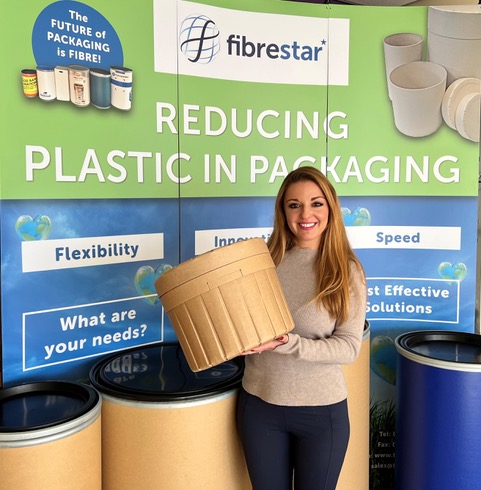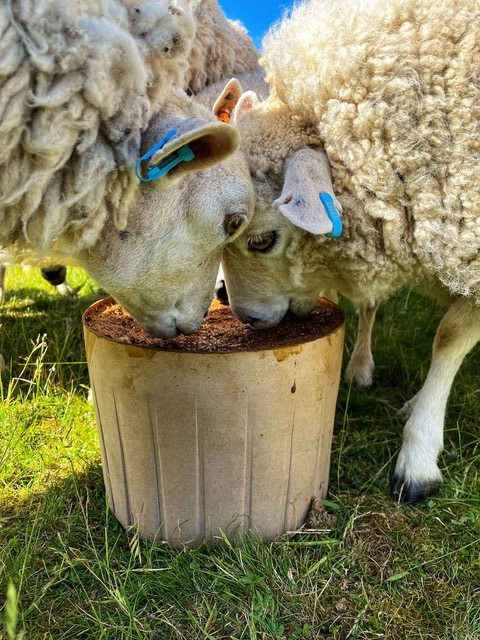UK market leader creates industry first with support from the GM Business Growth Hub
A Stockport SME has launched an innovative animal feed tub which will reduce carbon emissions and plastic waste in agriculture. It’s a success story with lessons for all businesses about the value of having an open mindset and responding to the needs of the market.
You might think a successful 90-year-old market leading manufacturer would be happy with its lot, but the recent experience of Stockport-based Fibrestar Drums is a brilliant example of how being open to change – and getting the right support – can transform your business.
The £8 million turnover SME provides industrial packaging solutions primarily for chemical and pharmaceutical markets and since 2013 has dedicated itself to promoting recycled, biodegradable cardboard as a sustainable alternative to the widely-used plastic tubs.
Things were going fine, notwithstanding challenges in persuading price conscious customers to switch from plastic to a more costly material that’s better for the planet. But it wasn’t until a conversation out of the blue that the company started on a journey towards a ground-breaking innovation and expansion into a completely new market.
“One day, we got a phone call from the biggest animal feed manufacturers in the UK, who’d found us online,” explains Giulia Bonito (pictured), Product Manager and one of around 65 employees based at Fibrestar’s Hazel Grove premises.
“They told us that they – like most other similar companies in the UK and Europe – were using plastic containers for their feed, but were desperate for a more environmentally friendly option.
They explained that disposing of their existing packaging was an issue for their farming customers, with many of the plastic tubs ending up either burned, or buried or lost in the fields.”
Here was an opportunity for Fibrestar to fill the void.

“Talking to the Innovation team at the Growth Hub changed everything for us,”
Giulia Bonito, Product Manager at Fibrestar Drums
Responding to the market
There was a fundamental problem, however: Fibrestar’s drums were tubular and had to be stacked one of top of the other, but the agricultural market needed ‘nested’ tubs that could be stored one inside the other, in order to maximise warehousing space and keep transport costs low.
Given that Fibrestar already had well-established markets, it would’ve been easy enough to say ‘sorry, we can’t help with that’, but as Giulia says, “That’s not us. Though we’d never served the agriculture sector before, we’re always looking at ways to improve. So, we listened to what they had to say and then went away and tried to see how we could move into this new area.”
It was easier said than done.
“We tried to come up with a way of using some of the existing machines we had to reconfigure our fibre drums, but we were working on a shoestring budget and didn’t have the right expertise to be able to do it. It was a frustrating time, because we had the appetite to find a solution, but were just lacking the knowhow. We needed someone to come in and say ‘Have you thought of this?’ and “Have you tried contacting these?’.”
The benefits of industry-university collaboration
A call to the GM Business Growth Hub’s Innovation team proved the spark that gave the project momentum.
“Talking to the Innovation team at the Growth Hub changed everything for us,” says Giulia. “We set up some meetings, they listened to our situation and made sure they really understood the challenges we were facing and what we wanted to achieve.
“Then they worked with us to drive things forward, getting the universities involved to provide technical expertise. We received help from Manchester Metropolitan University’s special materials department and the University of Salford’s robotics department, as well as Liverpool John Moores University and Lancaster University.
“The result of all this was that we were able to create a 3D model that we could take to the animal feed industry and say ‘This is a design we can make out of fibreboard, these are its specifications, here are the results of the durability testing and here’s a CO2 comparison report.’”
And, after some modifications, the new product – Nestub– was born: a fully biodegradable, durable and stackable paper-based tub made from recycled and virgin kraft paper, designed to compete with and eventually replace its plastic counterparts.

Making your own luck in business
The validation process did throw up one big surprise, though, says Giulia.
“When we gave the first prototypes to customers for some real-life testing, we found that the animals were not only eating the feed inside the tubs, but also the tubs themselves! All the packaging and adhesives we use are food safe, but we hadn’t realised that by coming into contact with the feed, the containers would become tasty for livestock!
“This has turned out to be a major advantage of the product and what makes it so special. What doesn't get eaten just disintegrates. And there's no more waste in the fields, which was the main objective and what the customer wanted when they first made that phone call.”

Funding opportunities and scaling-up
With Nestub launching in autumn 2023, what’s next for Fibrestar?
“The challenge now is to make our production line faster and more efficient,” says Giulia. “This would enable us to lower our costs and better compete with plastic.
“We’re still speaking to the Growth Hub on almost a weekly basis and with their help we’ve been successful in applying for an Innovate UK Edge grant, as well as being accepted onto Innovate’s Scale-up Programme – again, thanks to a recommendation from the Growth Hub.”
“I doubt we’d have been able to find all this support without the Innovation team’s help and it definitely would’ve taken us far longer to get the final product to market.”
Get in touch
Please contact us at 0161 3593050 or query below.
Take that first step and we’ll support you with whatever you need to succeed.
Sign-up to our newsletter
Insights, news, events and opportunities straight to your inbox.